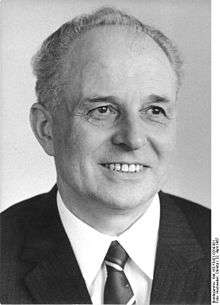Kurt Seibt
Kurt Seibt (13 February 1908 in Berlin – 21 June 2002) was chairman of the Central Revision Commission of the Socialist Unity Party of Germany (Sozialistische Einheitspartei Deutschlands; SED) and East Germany's Minister for Direction and Control of Regional and District Councils.

Biography
Seibt completed training as a metal spinner in 1922–1926 and worked until 1933 as a civil engineering worker and a stone setter. In 1922, he joined the Socialist Worker Youth, in 1924 the Young Communist League of Germany (Kommunistischer Jugendverband Deutschlands; KJVD) and in 1932 the Communist Party of Germany (KPD). From 1927 to 1930, he was First Secretary of the KJVD subdistrict of Berlin-Kreuzberg, from 1930 to 1931 State Youth Leader of the Brandenburg Red Sport Unit (Rote Sporteinheit) and a member of the Berlin-Brandenburg KJVD district leadership.
From 1934 to 1939, Seibt was a stagehand and a theatre master at the Deutsches Theater Berlin, and also a member of the outlawed KPD's party leadership. In 1939 he was arrested and in 1941, he was sentenced by the Volksgerichtshof to life at hard labour in a Zuchthaus for "undermining German fighting forces and conspiracy to commit high treason". Thereafter he was an inmate at Brandenburg-Görden Prison in Brandenburg an der Havel until 1945.
From 1945 to 1946, Seibt was the first secretary of the Brandenburg district leadership and a member of the KPD Brandenburg state leadership. From 1946 to 1952, he was secretary of the SED Brandenburg state leadership, and from 1947 to 1952, he was a member of the Landtag of Brandenburg. From 1952 to 1964, he was first secretary of the SED Potsdam district leadership,[1] although this was interrupted by his studies at the CPSU Party College in Moscow in 1956–1957. Moreover, he was from 1950 a candidate, from 1954 to 1989 a member of the SED Central Committee, and from 1953 to 1989 a Member of the Volkskammer.
From 1964 to 1966, Seibt was Minister for Direction and Control of Regional and District Councils and a member of the Presidium of the Council of Ministers, and from 1967 to 1989, succeeding Fritz Gäbler, he was chairman of the SED Central Revision Commission.[2]
Seibt received the Fatherland Order of Merit (Vaterländischer Verdienstorden) in 1965, the Karl-Marx-Orden in 1968 and 1988, the Clip of Honour for the Fatherland Order of Merit in 1973, the Star of the Friendship of Peoples (Stern der Völkerfreundschaft) in 1978, and the Great Star of the Friendship of Peoples (Großer Stern der Völkerfreundschaft) in 1983.
References
- "German Democratic Republic Districts (1952–1990)" Retrieved March 24, 2010
- "Liste von DDR-Persönlichkeiten". List of famous people from politics, science, culture and sports from the German Democratic Republic. Retrieved March 24, 2010 (in German)
External links
- Helmut Müller-Enbergs and Elke Reuter. Wer war wer in der DDR? (Who was who in the German Democratic Republic?) Entry for Seibt, Kurt. 4th Edition, Vol. 2. Ch. Links Verlag, Berlin (2006) ISBN 3-86153-364-2